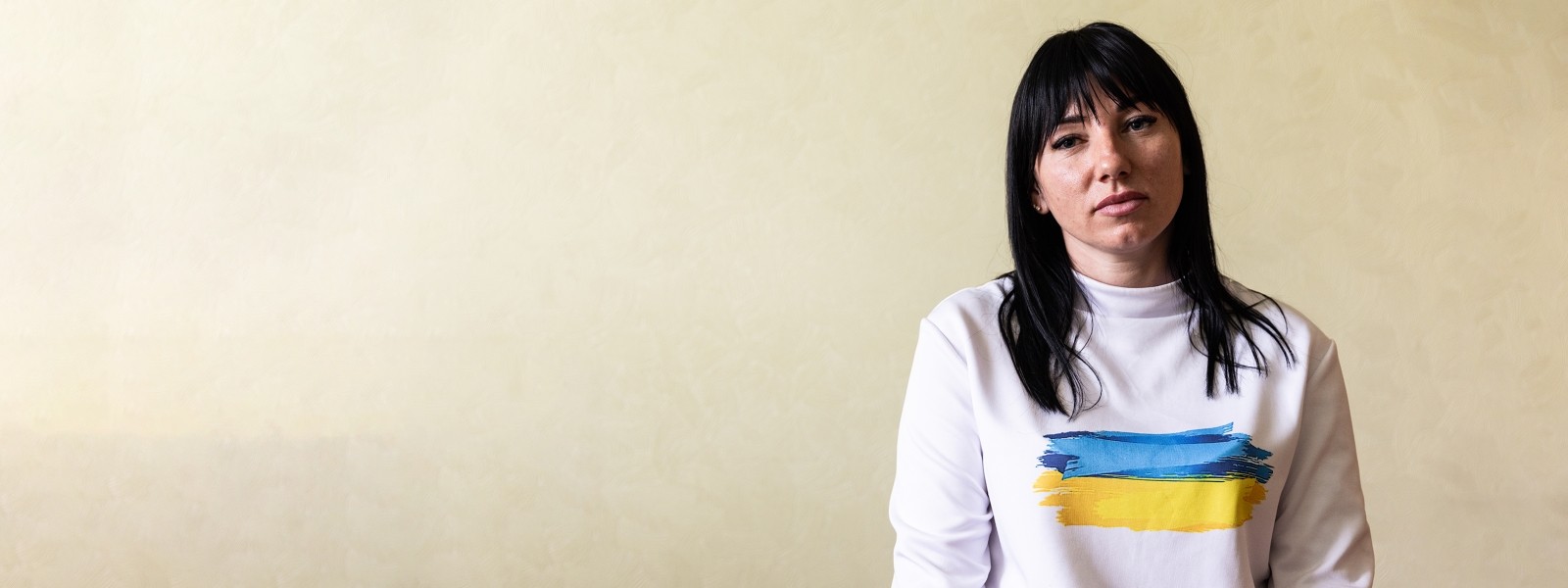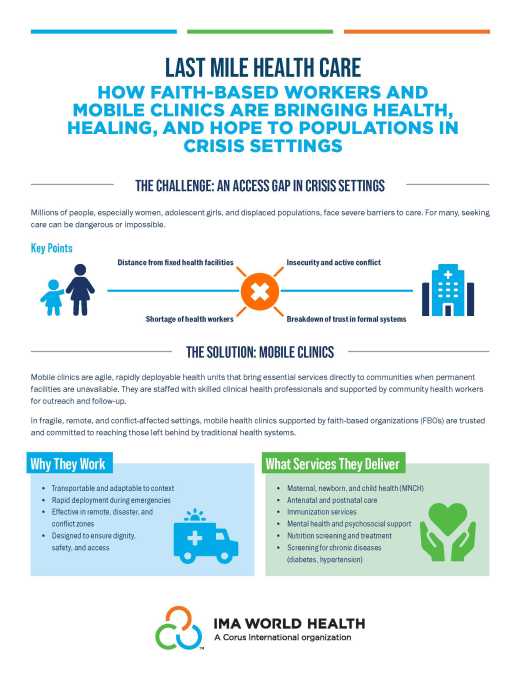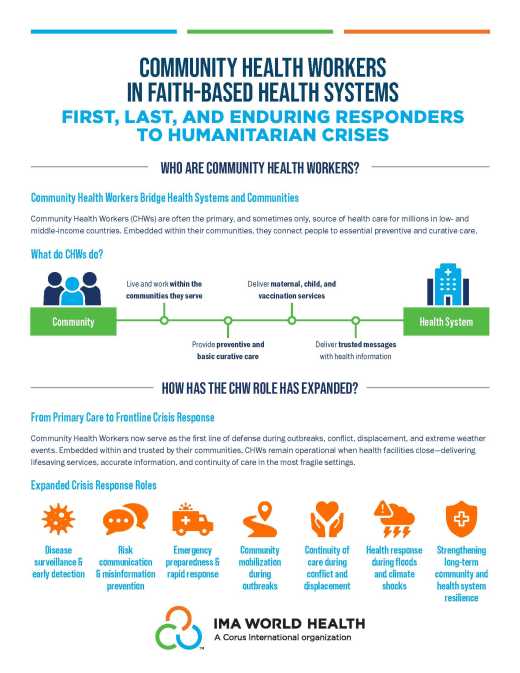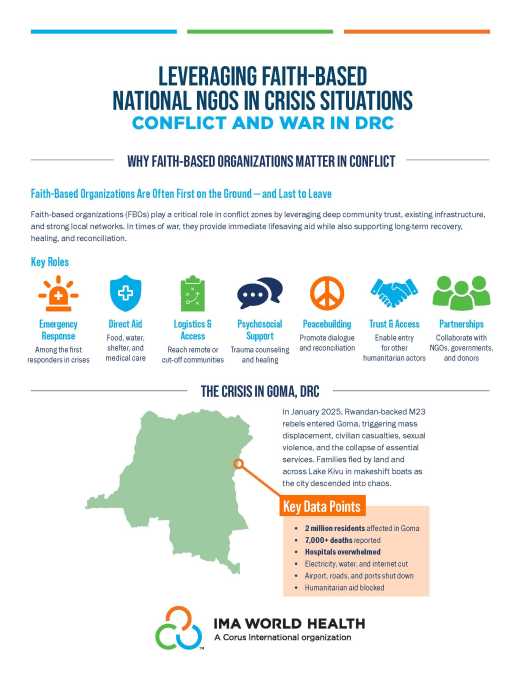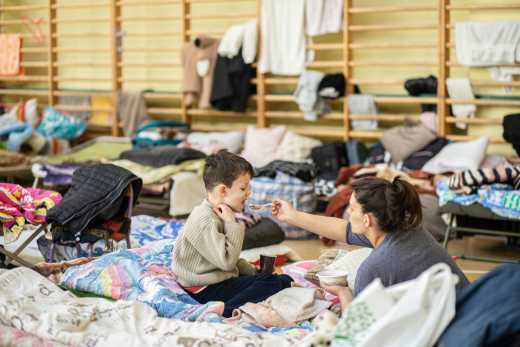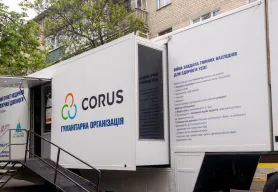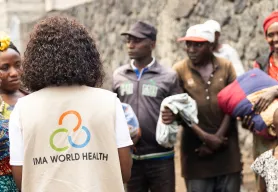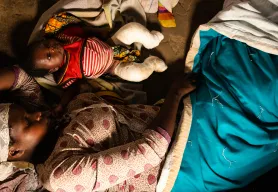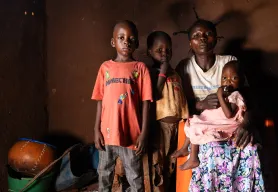Nearly one billion individuals globally live with a mental health condition, and people exposed to poverty, violence, disability and inequality are disproportionately affected. Global research repeatedly links poor mental health to worse physical health, early childhood development, substance abuse, violence, education, and nutrition.
IMA World Health and our fellow Corus organizations believe that improving mental health and psychosocial support (MHPSS) is critical to improving development outcomes for people in every stage of life. Therefore, we strive to expand access to mental health services, support survivors of violence against women, address mental health in humanitarian crises, reduce stigma and promote mental health awareness. We collaborate with local partners and use evidence-based interventions to ensure that our MHPSS approaches are the most effective and appropriate for local contexts.
MHPSS for survivors of violence against women
Enabling access to mental health and psychosocial care for survivors is an integral part of IMA World Health's framework for responding to violence against women. Our approach starts with client screening and counseling, ensuring survivors have a case manager to help them navigate and access all services available to them. We then employ two main approaches to support violence survivors:
- Cognitive Processing Therapy (CPT) is an evidence-based group psychotherapy approach for which we partnered with the University of Washington and Johns Hopkins University to develop an apprenticeship training model to support women survivors. Research demonstrated CPT’s effectiveness in reducing reported PTSD, depression, and anxiety among survivors.
- Community-based trauma healing (CBTH) is an innovative strategy to improve individual and community resilience to trauma. We train CBTH Companions to facilitate interactive, de-traumatizing community sessions focused on the causes and effects of trauma and how to constructively deal with expressions of trauma.
MHPSS in humanitarian response
Armed conflicts and natural disasters cause significant short- and long-term psychological and social suffering, and the ensuing humanitarian response can further exacerbate the impact on affected populations’ mental health if not implemented well.
One of our priorities in emergencies is to protect and improve people’s mental health and psychosocial well-being through a layered approach:
- Access to basic services and security;
- Strengthened community and family support;
- Established, focused non-specialized support; and
- Linkages to specialized services.
Our local partnerships are critical to adequately addressing humanitarian needs and ensuring mental health assistance is available in the wake of a disaster.
Digital MHPSS outreach
As the global adoption of and reliance on communication technology increases, innovative digital tools can scale access to psychosocial services, enable remote capacity building of service providers, support mental health and well-being promotion messaging, and allow for more accurate data collection and use to improve MHPSS prevention, mitigation, and response efforts.
We successfully use digital platforms in our response and prevention programs with marginalized populations that can be hard to reach, such as migrants, refugees, and youth. These platforms enable the integration of MHPSS information with other needed services (health, livelihoods, legal) for migrants and refugees and engage youth with mental and emotional health guidance as they face challenges.
PROJECT HIGHLIGHTS
In partnership with Red Institutos Comunitarios (Red-ITC), IMA World Health's fellow Corus organization Lutheran World Relief implements the Creating Spaces for Youth Employability (CREE) project. The CREE project trains 1,100 young participants from 22 municipalities in seven departments of Honduras in life skills and context-relevant work competencies to support their employability or entrepreneurship. The project pilots an innovative virtual platform, EmpleandoMentes (or “Employing Minds” in English), that integrates technology and extension services to support holistic well-being, including mental health. The EmpleandoMentes digital platform connects young people with livelihoods assistance and online community while providing personalized virtual psychosocial support. It offers practical, easily digestible information on soft skills, self image, resilience, leadership, and other essential topics for holistic human development. The platform employs engaging audiovisual formats to capture the attention of young people in the region, and it also serves as a platform for free professional guidance on mental and emotional health topics.
Corus organizations, including IMA World Health, immediately responded to humanitarian needs following the February 2022 Russian invasion of Ukraine. In addition to providing food, shelter, cash and livelihoods support, Corus organizations established a Mobile Medical Unit (MMU), staffed with Ukrainian medical professionals, to bring health services to patients in newly liberated areas. Through the MMU, 12,000 psychological and psychotherapy sessions were extended to 9,636 patients. Corus also collaborated with local partners to establish 6 housing centers (sanatoriums) in which campaigns were conducted for more than 3,000 people to raise awareness of violence against women and girls, referral systems and survivor-centric care options. A “safe space" for women and girls was piloted in the Lozova community in Kharkiv. The site hosted social events as well as reintegration and social rehabilitation activities, medical check-ups, and psychological support for more than 200 participants.
Funded by the US government, the Counter violence against women and girls Program (known locally as Tushinde Ujeuri) employed a holistic approach to addressing violence against women and girls that championed mental health support alongside medical care, legal services and social and financial recovery. The project drew on the globally recognized leadership of University of Washington (UW) and Johns Hopkins University (JHU) in this area to guide violence against women and girls’s mental health work. Core components of the project’s PSS package included client screening and lay counseling, Cognitive Processing Therapy (CPT) counseling, and community-based trauma healing (CBTH). Identified from community health committees, 80 CBTH Companions were trained and led 1,083 trauma health sessions, reaching 23,350 trauma survivors and other members of the community. More than 23,400 individuals received psychosocial services offered by the Tushinde project.
With funding from the Centre for Disaster Philanthropy and the Evangelical Lutheran Church of America, fellow Corus organization Lutheran World Relief established the digital platform VenInformado, which provided Venezuelan refugees and migrants with critical, accurate and up-to-date information and personalized virtual legal, psychosocial, COVID-19 and livelihoods assistance. Lutheran World Relief worked in close collaboration with local partners Encuentros and Center for Psychosocial Care (CAPS) to provide free guidance on topics ranging from managing mental health, COVID-19 protection and regulations, legal requirements for refugee and residency status, resources for survivors of violence against women, and guidance for starting a small business. Via the platform, Lutheran World Relief and CAPS created the channel #SaludableMente (#HealthyMind), a space that addresses various issues around change, grief, depression, violence, xenophobia and other important content to empower and encourage conversations around emotional well-being with migrants and refugees. Through its personalized one-on-one support portal, VenInformado staff have also responded to over 36,000 legal and psychosocial inquiries since its launch in 2018.


